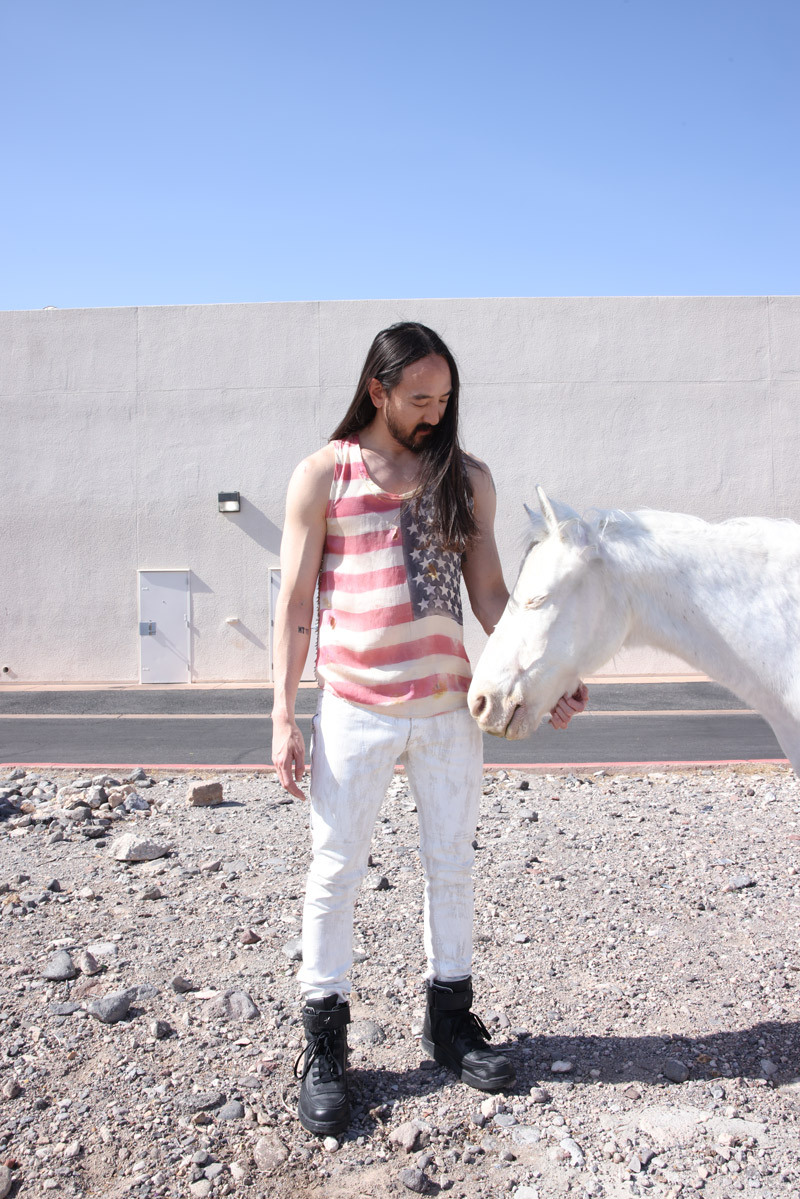In Las Vegas with DJ Steve Aoki and an enchanted white horse
Published in Nuda:Saga
Talking to superstar DJ and EDM hero Steve Aoki, you’ll encounter an artist with a personality somewhere between anime nerd and rigid boot camp trainer. Some of his statements could be taken straight out of an issue of Men’s Health, or some guidebook on transcendental self-discovery. We get the sense he meditates to the beat of “Harder, Better, Faster, Stronger.” Aoki´s unwavering passion for music and cake throwing along with his relentless work ethic have propelled him to great heights. For Nuda, he touches on the art of writing a captivating story as well as the inevitable cultural revival of the 00s. As a small add-on, you’ll also learn about his secrets to speedy and concentrated reading – valuable pointers for anyone with self-diagnosed adult ADHD.
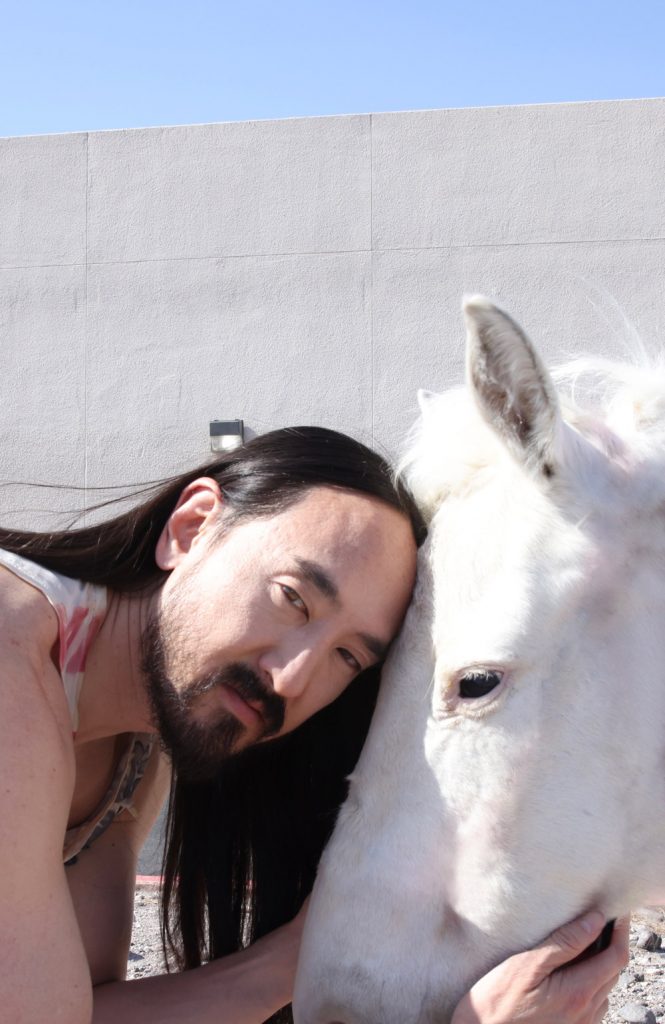
Nuda: You recently posted a video of yourself and German DJ star Solomun sharing ginger shots at the club at 3am, captioned “Health on my mind 24/7”. I guess it’s necessary in a long DJing career to step out of the partying at some point and view it more as a job. Have you ever worried that approach, always being more sober than your audience, would turn you more cynical?
Steve: When you think of it as a job, you’re going to be jaded and cynical which might have a negative outlook on what you’re doing. I don’t look at it as a job. Honestly, I don’t even want to know how much I’m getting paid. Once I’m booked, I’m playing, I don’t care. I could be doing it for free. But I really love finding and crafting discipline. I like the feeling that you’re accomplishing something for yourself. I’m not even talking about DJing or music, I’m talking about life in every aspect.
In order to grow you need to develop your skill set – sharpen a blade in your mind to be better at something. That’s something you can’t do in comfort. It’s when you feel that extra burn working out that real muscles are going to develop. You can’t get out during that pain. You have to stay in the pain. I love being in a disciplinary system, because I think they’re all systems of the mind. When I’m on the road, when I’m in the studio, when I’m working out, when I’m doing neuro-feedback on my brain, I always need to feel like I’m training to be a better human.

Nuda: Speaking of Solomun, do you have a lot of DJ friends privately?
Steve: The DJ friendships I have… We’re all like passing ships at night, constantly moving. I’m friends with other DJs, we have a very good understanding of each other’s lifestyles. If you worked in the scene for a long time, you’ve done the partying. We all did that stuff that you do in the beginning, because it’s so much fun. But in order to do this for a long time, you have to truly hack your brain and mindset, or else it’s just not going to last. That’s why I don’t do drugs and don’t drink heavily. I honestly look at myself as an athlete in order to do what I do, at this scale, pace, quantity, and quality. I can’t do just the bare minimum. If I had that attitude I wouldn’t last very long. People would be like: “Steve Aoki is fucking boring. He’s just old now. He doesn’t give a shit.”
Nuda: You’re not known to be boring…
Steve: My job is to entertain. Or fuck “job” – I don’t want to use that word, this is a lifestyle. This is my blood, sweat, and tears. When I’m playing, I look at the crowd to make sure I’m validated. I try to find people that are on the same level as I am and when I find them, I zoom in on them and say: “This show is for you.” At my gigs you can either be a part of the energy in the room, or you can be a voyeur. The shows are for the people who travelled far and spent hours and hours working just to get the money to get there. Some people fly all across the world to be part of the experience. First and foremost, you guys are the VIPs.
It’s about the art of absorption
Nuda: So you arrive at a stage where you’ve never been before. Do you immediately pick out a few people in the crowd and then imagine you’re playing just for them for the rest of the night?
Steve: I keep finding more and more people as the show develops. The feelings start brewing. Everyone’s got a different kind of experiential arc, right? You notice people that earlier were kind of fertilising the ground and then, one hour later, being this flower in full bloom. I want to give my audience that sunshine and give them all that I have, so they can grow into beautiful emotional beings and really be beyond the physical: Take yourself out of this vessel, the human body, and become this emotional, spiritual being. Selfishly, I’m proud because the majority of what I’m playing is my music, meaning that my music is what is getting people to break out of themselves.
Nuda: We’re touching on something which is obviously a big part of DJing: The immediate emotional reaction, being there in the moment, creating these unique experiences. I guess another big part of DJing can be considered storytelling, would you agree?
Steve: Oh, yeah, absolutely. A DJ is a storyteller. I say that all the time. We are all building our own narratives when we play a show. My narrative changes through the evolution of my sets and the evolution of my music. I try to paint a very clear picture in my music. I did an album series, Neon Future, telling the story of the future, of where our technology is going, fusing that through music and with real-world scientists. I don’t think Bill Nye has ever made a song before.

Nuda: Maybe not.
Steve: Getting J.J, Abrams on a song was incredibly cool for me. It was just as cool with him as with all the various other artists I’ve worked with, Empire of the Sun, Fall Out Boy.
Nuda: A lot of follow-up questions here. What was it like working with J.J. Abrams?
Steve: He has a whole room of just rare synths. Any synth lover would be fucking freaking out if they went to his room.
Nuda: Oh really, I didn’t know that.
Nuda: He’s a big synth collector. He loves music and he has all this gear. You could tell he’s a producer of sci-fi. He is like the ambassador of science fiction. When I think of science fiction, I think of J.J. Abrams.
Nuda: Oh wow.
Getting J.J, Abrams on a song was incredibly cool for me
Steve: My new story is HiROQUEST. I’m writing a book right now. I believe you’re the first person I’ve told outside of my team that I am writing a book.
Nuda: Very interesting! Would you be able to elaborate on that?
Steve: The first book of HiROQUEST will go over the story of HiRO and his superpower of frequency. He’s trying to obtain five different rings, from five different factions.
Nuda: I’d love to hear more about the process of writing for you. I think for a lot of people, you come across as this extremely energetic person, an extrovert stage persona. There’s a big contrast between that and the thought of you sitting down to write a book.
Steve: It’s a very similar approach to producing for me. I already wrote a book called Blue: The Color of Noise. It took six years to finish. Originally, it was 300 pages, but I brought in an incredible writer, Daniel Paisner, who helped me put it together, and thanks to him, it ended up being up to 250 pages. The most important thing I’ve learned about my busy life is that I like to tackle many different projects. I’m part of a lot of different businesses. I’m not one to sit on a couch and watch TV. When I’m on vacation, I don’t go lay on a beach and soak in some sun rays. My vacation is to write or do something productive and be creative. I never just sit around. I might be sitting there, yes, but I’ll be meditating. I need to have a purpose.
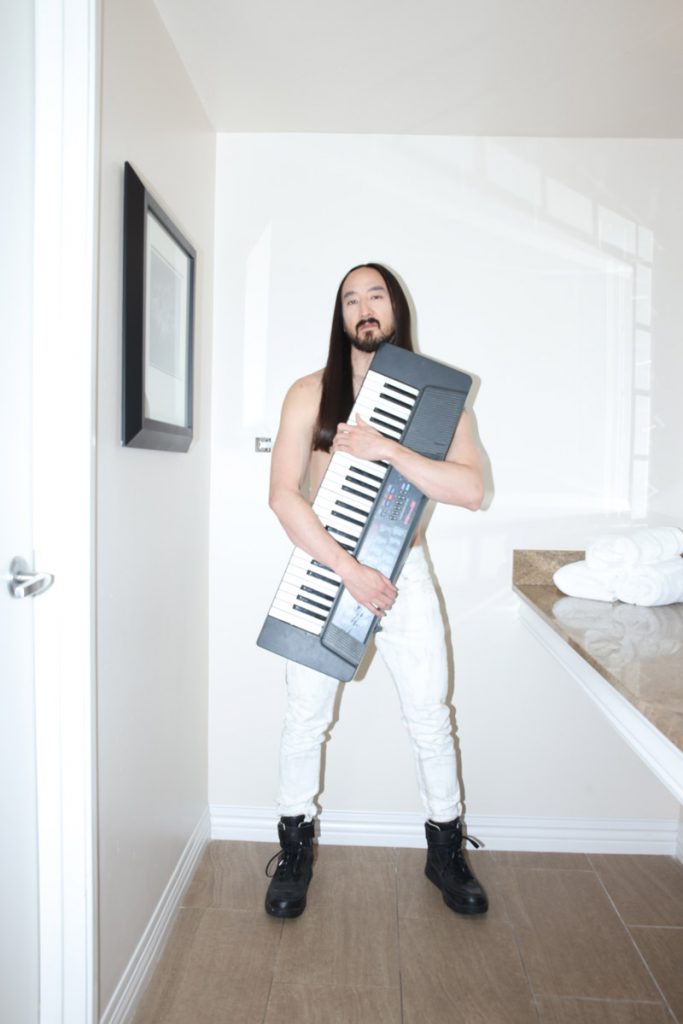
Nuda: I’m sure you listen to loads of music as all DJs and music producers do. As a writer, do you ever find time to read just for enjoyment or in order to find inspiration for your writing? What’s your favourite book?
Steve: There are times when you just enjoy the art of reading. You know, you just pick up a book, sit down and enjoy it. I stopped doing that. I did that for a period of time maybe fifteen years ago, in the late 2000s. Once you enjoy reading, it’s not about how much you read, it’s about sitting there and soaking in the pages. I sometimes find myself never finishing the book.
Nuda: Right.
Steve: Now it’s just too casual for me. I need to have an efficient system. Ten years ago I was talking to a friend of mine who’s really big on memory and the brain. He showed me certain hacks on how to ingest and retain as much information as possible, in a short amount of time. It’s about the art of absorption.
Nuda: That makes sense.
Steve: How much can you absorb? If you break it down, books are about 300 pages. Well, you can go into these non-fiction books with a million pages… But generally, it’s like 300 pages. Or 280, or whatever. So if you sit down and read forty pages a day, you’ll finish a book on average by a week. That means that you can ingest fifty-two books a year.
Nuda: Yeah, if that’s all you do, pretty much.
Steve: When I was in college, I was in women’s studies and did a sociology major. Read and digest, that’s all we did. We had to do 400 pages a day and then go into class and discuss it. For the first three years, I hated it. But by the fifth year, I’d learned to love it. I grew to love being involved in what I’m reading and discussing it with people that care. It’s the same way with my shows. I’m looking for people that fucking give a shit. For me to do forty pages a day was like a no-brainer when you’ve already done 400 in college. I’m travelling, so doing forty is not too difficult. I’ll just keep this system down so that I can absorb and digest fifty books a year. Bad habits like playing video games take away from your discipline. Reading is like a workout for your brain.
The great thing about stories is that you can fucking say some crazy shit that doesn’t have to exist
Nuda: That’s inspiring to hear. I think there’s lots of talk these days about self-improvement, even these transhumanist ideas on improving your brain using all sorts of advanced methods and drugs. Something as basic as reading can really do more than any of these new ways of enhancing your brain, right?
Steve: I’ll tell you one more thing about my hack on reading. If you like to hear your inner voice and you like to follow it when you read, you have to stop doing that, if you care about absorption and time efficiency. You should read a page by reading only the key words. Instead of reading the line or the full sentence you do the whole page. You read the keywords, and you always have your finger on the book. Your eyes will follow your finger which will keep you focused on the actual words. If you don’t have your finger on the book, your brain will start thinking: “Oh shit, I’m really hungry. What am I going to eat? I gotta call my friend. Oh, fuck, I forgot what I was reading.” Since I’ve practised this I understand how some people can read a book a day and tell me everything about it.
Nuda: That’s great. So looking back…
Steve: My favourite book is Sapiens. It’s awesome. I loved it so much that I even found my way into Yuval Noah Harari’s inner circle. And he’s on my album Neon Future.
Nuda: Oh wow. In what capacity?
Steve: I got him to talk about the neon future. I didn’t bring him to the studio, I just asked him to talk about it and then I made a song using his voice. He’s a featured artist.
Nuda: That’s brilliant. Have you guys met in person as well, or was it just…
Steve: No. I don’t even know if he knows who I am or what I do.
Nuda: I’m sure he knows. Do you ever read any fiction?
Steve: Not really. I’m more of a watcher when it comes to fiction. I don’t sit and watch TV, but I still download anime on my iPad when I’m on the road. I really love Attack on Titans. You get to understand both sides of a war where people are dying. I also love Demon Slayer, One Piece, and Dragon Ball. I’m really a Japanese anime freak.
Nuda: Did you grow up with that stuff? Or was that something you found later in life?
Steve: I grew up with Thundercats and whatever shows were on American television. I found anime as a teenager. I joined an anime club in college and it opened up a whole new world for me. I would go every week and we’d listen to the soundtracks and dive into the shows.
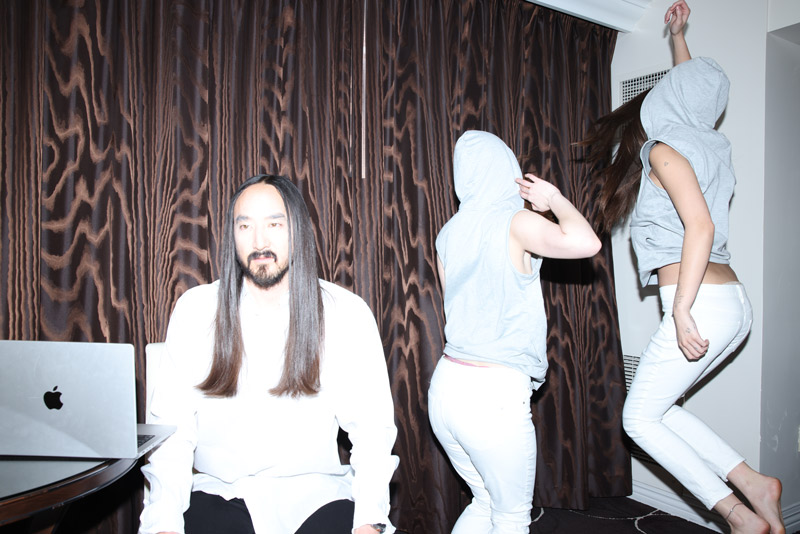
Nuda: What do you think makes a good captivating story?
Steve: You have to write a story that can relate to everyone, in some capacity. If people can’t relate to it, it’s more difficult to actually scale your story and make it reach millions of people. It should be about something regarding the human condition, whether it’s sadness, pain, betrayal, happiness, or longing. If it doesn’t make you feel, forget about it. On top of that, you can layer fantasy. The great thing about stories is that you can fucking say some crazy shit that doesn’t have to exist.
Nuda: I also wanted to talk about the era in which you broke through internationally – the early 2000s. Those years now receive a lot of attention in culture, we’re observing the reappearance of “indie sleaze” and so on. I’d be interested in hearing about your relationship to that era today. Do you feel nostalgic about it? Do you find inspiration in it? Did you need some time away from it?
Steve: I think it’s really cool when I see stuff from that time popping up again. For example, Mark Hunter [Cobrasnake] just dropped a book with Rizzoli that really documents the LA scene of that time in a way that no one else has done. I’m so happy that Mark, who was an incredible documentarian of that era, did what he did. I don’t really revel in the past so much. I’m personally very focused on the here and now. As any writer or any producer will tell you, we’re always focusing on the future. We are predictors. And if we’re great writers, we’re great predictors.
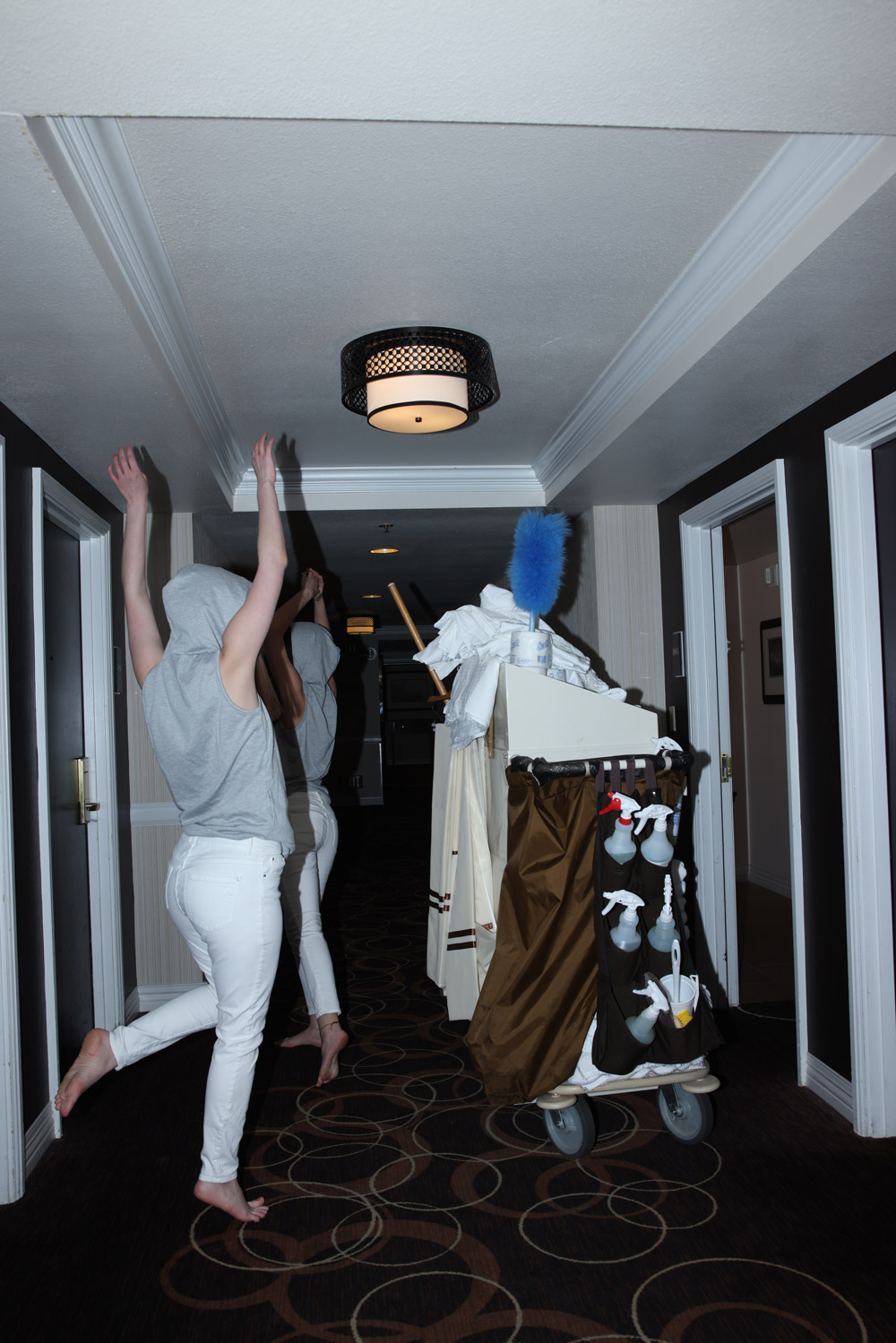
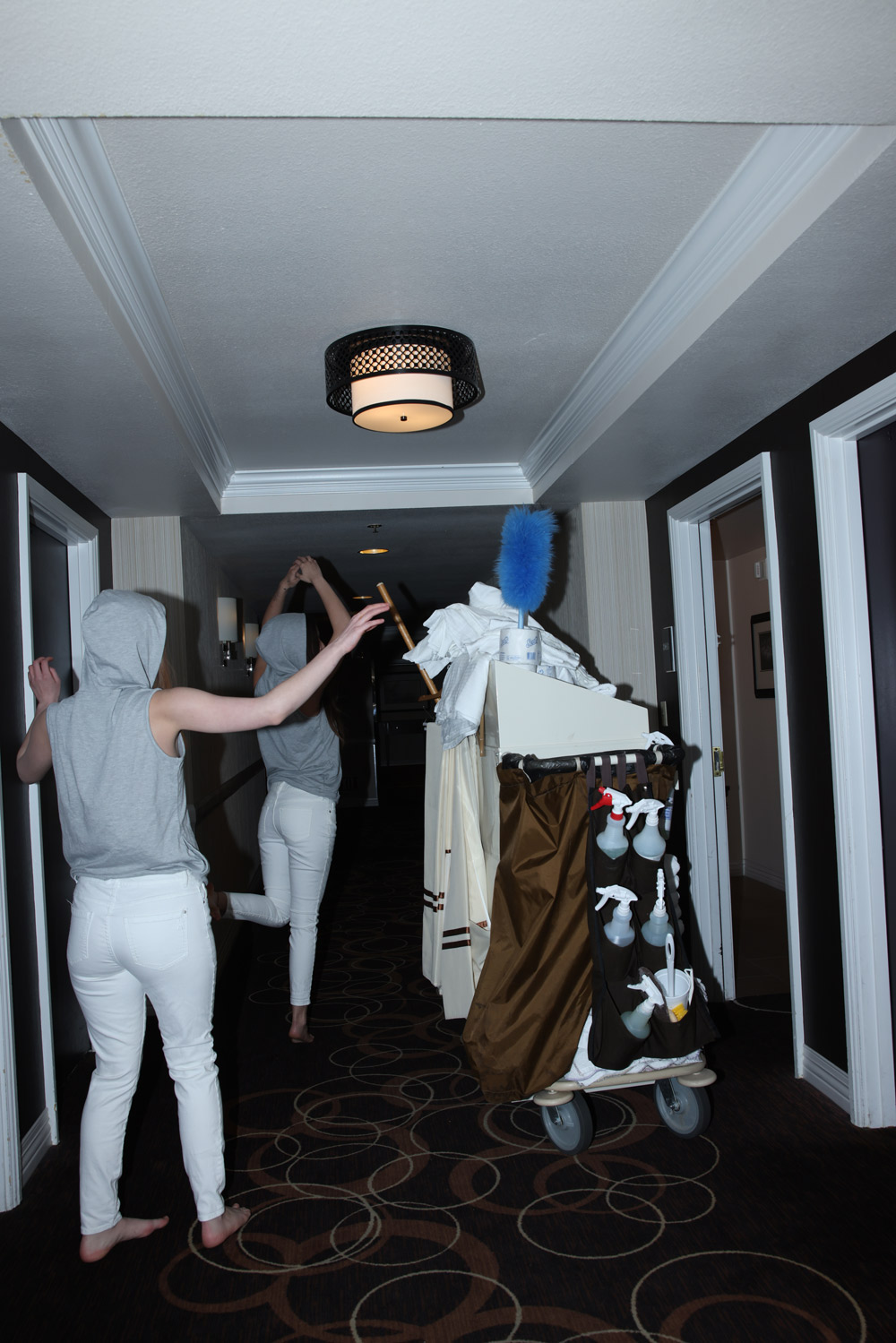
Nuda: Why do you think the 2000s have such a strong appeal again today?
Steve: For the kids that are coming in now, it feels like it wasn’t part of their time – so that excites them. For us who were there, it’s like, “oh yeah, it’s cool”. I recently dropped a song called Friends with Dimitri Vegas and Chapter & Verse, and we sampled Justice Vs Simian, We Are Your Friends, from 2003. It’s such a fucking classic sample from the 2000s era. Jimmy and I said, “oh yeah, we got to do this one, it’s going to bring it back.” Interestingly enough, when I play it in America I barely see anyone singing the lyrics. It’s too far in the past.
Nuda: That’s crazy.
Steve: I’ll tell you what was different: There was no social media. There was MySpace, there was the Internet, but you went on different websites. In the 2000s, I threw two parties every single week: Dim Mak Tuesdays and the Banana Split Sundays. These were rooms holding like 300 or 400 people, but we were the hub of breaking music in LA. Everyone was trying to get in, all different artists wanted to play in this tiny room. I remember when Lady Gaga performed there. The stage wasn’t even a real stage, it was the table to hold champagne. No one could see what was going on inside unless you viewed it on Cobrasnake the next day. I don’t think you have this vibe now because of social media – everything is accessible through Instagram. There’s nothing hidden anymore.
| Interview | Kornél Kovács |
| Photography | Chessa Subbiondo |
| Editor | Benjamin Schiffer |

